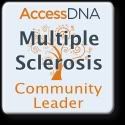Data also showed reduced fatigue and improved cognition
TORONTO – April 16, 2010 – Biogen Idec (NASDAQ: BIIB) and Elan Corporation, plc (NYSE: ELN) today announced results from a one-year, longitudinal health outcomes study (n=324) in which patients with multiple sclerosis (MS) who received 12 infusions of TYSABRI (natalizumab) reported improvements in quality of life (QoL) measures, as measured by validated tools. The goal of the study, which was performed in conjunction with HealthCore Inc., a health-outcomes research company, was to assess patient experiences with TYSABRI in a real-world setting. This research was presented in three posters at the American Academy of Neurology’s (AAN) 62nd Annual Meeting in Toronto, April 10 - 17, 2010. The AAN Annual Meeting is the world’s largest gathering of neurologists. “Because MS is such a debilitating disease that affects patients physically, cognitively, psychologically and socially, it can have a significant impact on their quality of life,” said William Stuart, M.D., Medical Director of the Multiple Sclerosis Center of Atlanta. “These analyses, based on patient-reported outcomes, are critical to understanding the benefits of treatment with TYSABRI over the long term and in a real-world setting.” The one-year longitudinal study assessed health outcomes from the perspective of the patient using validated patient-reported outcome (PRO) measures prior to treatment initiation and after the third, sixth and 12th infusion with TYSABRI in a real-world setting. A majority of the patients in the study were female (77.8%) with mean age of 46.7 years and mean years since diagnosis of nine years. Quality of Life Study Results After one year of treatment, patients reported statistically significant improvement in: - general health-related QoL, as measured by the 12-item Short Form Scale (SF-12v2), with higher scores indicating better QoL
- MS-specific QoL, as measured by the 29-item Multiple Sclerosis Impact Scale (MSIS-29), with lower scores indicating better QoL
Both scales report the physical and psychological aspects of QoL in two summary scores. For both scales changes in mean scores from baseline through the 12th infusion were evaluated after adjusting for baseline patient-level and treatment characteristics. SF-12v2 Physical Component Summary (PCS) scores improved significantly from baseline (BL 34.25, 12th 36.66; p<0.001)>.
Similar improvements were observed in the Mental Component Summary (MCS) scores, which also improved significantly from baseline (BL 43.13, 12th 46.77; p<0.001). After controlling for covariates, a statistically significant improvement was also observed in MSIS-29 physical impact scores (BL 47.38, 12th 40.43; p<0.001).>(BL 42.01, 12th 34.09; p<0.001)>
The results of these findings are consistent with results from pivotal clinical trials and show the beneficial impact of TYSABRI on QoL in MS patients. Results show that improvements were seen as early as three months and were sustained for 12 months.
The poster titled Improvement in Health-Related Quality of Life in Multiple Sclerosis Patients Receiving Natalizumab in the United States (P02.166) was made available for viewing on April 13 from 3-7:30 p.m. EDT. The poster titled Effect of Natalizumab on Disease-Specific Quality of Life after One Year of Natalizumab Treatment (P02.164) was made available for viewing on April 13 from 3-7:30 p.m. EDT.
Fatigue and Cognition Study Results After one year of treatment, patients reported:improvement in cognitive function lower impact of fatigue on daily functioning.
Cognitive function was measured by the six-question Medical Outcomes Study Cognitive Functioning Scale (MOS-Cog Scale, score range 6-36) with higher scores indicating better reasoning skills, memory, concentration, ability to start several actions at one time and ability to react. Fatigue was measured by the five-question Modified Fatigue Impact Scale-5 (MFIS-5, score range 0-20), with lower scores indicating lower impact of fatigue on physical, cognitive and psychosocial functioning.
After controlling for covariates, on average MOS-Cog scores increased significantly over time (BL 25.12; 12th infusion score 26.19, p=0.0006), indicating improvement in cognitive function, and MFIS-5 scores decreased significantly (BL 12.36; 12th infusion score 11.16,p=0.001), suggesting lower impact of fatigue on daily functioning.
TYSABRI is approved in more than 45 countries. In the U.S., it is approved for relapsing forms of MS and in the European Union for relapsing-remitting MS.
Data from the Phase III AFFIRM trial highlights TYSABRI’s powerful efficacy. According to that data, which was published in the New England Journal of Medicine, after two years, TYSABRI treatment led to a 68 percent relative reduction (p=0.001).
TYSABRI increases the risk of progressive multifocal leukoencephalopathy (PML), an opportunistic viral infection of the brain. The risk of PML increases with increasing duration of use. Other serious adverse events that have occurred in TYSABRI-treated patients include hypersensitivity reactions (e.g., anaphylaxis) and infections, including opportunistic and other atypical infections. Clinically significant liver injury has been reported in patients treated with TYSABRI in the post-marketing setting. Common adverse events reported in TYSABRI-treated MS patients include headache, fatigue, infusion reactions, urinary tract infections, joint and limb pain and rash.
TYSABRI is co-marketed by Biogen Idec Inc. and Elan Corporation, plc. For more information about TYSABRI, please visit www.tysabri.com, www.biogenidec.com or www.elan.com, or call 1-800-456-2255" |










